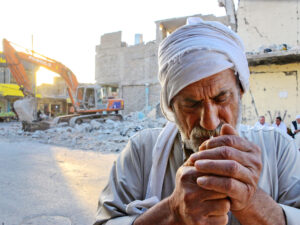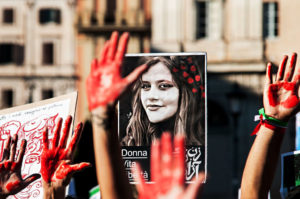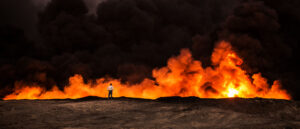If you want to start an argument among Western Leftists, you need only mention the word “Rojava”. Ever since its formation a decade ago, the Kurdish-led polity has split the Left into two camps. On one side, its defenders hail the region as an egalitarian, ecological, direct-democratic utopia; on the other, its detractors dismiss it as an ethnically segregated petro-statelet serving Kurdish national ambitions. Which side is correct?
Between 2018 and 2020, I spent three years living in Rojava, the region governed by the Autonomous Administration of North and East Syria (AANES). There, I heard a different take on the revolution’s successes almost every day. US military commanders saw the region as a useful ally against Isis and a counter to Iranian influence. Kurds, women, and Christian and Yazidi villagers were pragmatically grateful to AANES for guaranteeing Syria’s highest standards of human rights and humanitarian provision in the face of ethnic cleansing by Turkey and Isis.
Yet some anarchist volunteers left despondent, their idealised view of the “Rojava revolution” foundering on the reality of mass poverty, limited political engagement and an increasingly prominent security apparatus. Many more remained, accepting ideological “contradictions” as part of the revolutionary process. Certainly, since 2013, it has become apparent that the revolution could never have survived without fulfilling a number of seemingly contradictory roles.
Rojava achieved autonomy after the 2011-12 Syrian uprising saw regime forces withdraw from the country’s Kurdish north. This enabled Kurdish fighters loyal to Abdullah Öcalan, their long-imprisoned leader, to descend to northern Syria from the mountain eyries where they had long been engaged in a bitter guerrilla war against Turkey. There, a committed cadre lived a necessarily communal and frugal life. Kurds who have spent time “in the mountains” speak nostalgically of the comradeship and holistic relation to nature they found there. But these political organisers now found themselves tasked not only with fending off Isis, Al-Qaeda offshoot Jabhat al-Nusra, and the Turkish Armed Forces, but also with establishing a society capable of sustaining millions.
These lifelong partisans of the Kurdish cause have experienced an almost rapturous vindication of their struggle. One middle-aged woman told me, with shining eyes, that 38 of 40 Kurds in her initial training group had lost their lives fighting Turkey, only for a liberated Kurdish homeland to suddenly emerge across the Syrian border. Privately, though, Kurdish militants will often admit frustration with a restive local population uninterested in their leader’s lofty ideals and rhetoric.
Ideas such as Öcalan’s have never before been implemented on such a mass scale. Following his 1999 capture by Turkey’s intelligence organisation (MIT), Öcalan — whose Kurdistan Workers’ Party had been fighting for an independent, socialist Kurdish state — encountered the work of US anarchist Murray Bookchin. Building from Bookchin’s “social ecology”, he developed a critique of state socialism also informed by feminist thought. The Kurdish leader came to advocate a “federation of federations” — a decentralised network of local communes feeding consensus decisions via city-level municipalities into a democratic polity, all based on a re-evaluated relationship with the natural world and a cooperative economy.
There is a certain mysticism to Öcalan’s writings. His works were transmitted to the outside world from the prison island Imrali in lieu of defence submissions at court, and the subsequent lack of references makes its arguments hard to parse. His works are peppered with gnomic historical speculations, often prefaced with the disclaimer “Could it be…?” Rather, the jailed leader’s brilliance lies in distilling Bookchin’s complex analyses into maxims accessible to the Kurdish public. He deploys a Bookchinite account of history as the steady expansion of “hierarchy” from the patriarchal-gerontocratic tribe through the city-state to capitalist modernity. This teleology is then tied to the fate of the long-dispossessed Kurdish people in their Mesopotamian homeland, with Öcalan marshalling his people as the inheritors of the Fertile Crescent’s idyllic “natural society”.
The idea was for a network of self-governing communes to grow up alongside and ultimately supplant the authoritarian states which today occupy the Kurdish homelands. But, as Rosa Luxemburg observed after October 1917, revolutions do not grow up little by little: they are ejected into the world fully-grown and shrieking. In Rojava, Öcalan is respected as a symbol of Kurdish and women’s liberation, but little-read by civilians; Bookchin is known only to the Kurdish nomenklatura, and that indirectly. Reality, in the form of inter-ethnic warfare, bread shortages and depleted energy resources, immediately intruded on Öcalan’s somewhat utopian vision.
Most obviously, without its black-market petrol revenues, the impoverished Rojava administration could never have kept millions from starvation. Ambitions to build a greener economy by transitioning to more localised, cooperative agriculture and renewable energy sources have been frustrated by a number of factors: Turkish damming of the Euphrates and control of key water infrastructure; the diversion of power to areas controlled by Assad and Turkish-backed jihadist militias; war damage to dams and oil refineries; and an embargo preventing industrial imports. Hence the unlikely spectacle of a “green revolution” underwritten by oil wealth. (Could it be…?)
Economically, too, the AANES has been forced to proceed cautiously, expropriating Syrian regime holdings, but largely leaving private property and capital untouched. Oil revenues subsidise cheap diesel and bread, with these efforts reaching far more people than the scattering of co-ops. Sporadic attempts to develop agricultural autarky are limited in their effectiveness by the economic embargo and subsequent forced, continued reliance on smugglers who bring in the weapons the Kurds need to fend off Turkey, but also flood the markets with cheap Turkish chicken stock, flip-flops and cigarettes.
Similarly, economic pressure, priorities of national defence and the challenges of managing conservative and sometimes openly pro-Isis local populations have hampered AANES’s efforts to promote genuine grassroots political participation. AANES has made truly impressive steps in challenging deeply-entrenched patriarchal norms by introducing women-led governance, restorative justice and social education programmes, even in former Isis heartlands — but the devolution of decision-making authority is partial and inconsistent. I’ve attended commune meetings in the Kurdish Jazira. Here, locals complain about road repairs, bread and price-gouging, but absent calls for greater investment in infrastructure, the Kurds broadly align behind the AANES. Directing an economy or a war requires centralised policy, and most locals are content to leave these issues to their leaders, visiting the commune only to collect the chits for their subsidised bread and oil.
Paradoxically, it is in those conservative Arab regions only recently liberated from Isis that the AANES has been repeatedly forced — through admirably open-minded public consultations, pressure from conservative tribal federations, and street protest — to rethink, revise or defend its positions on issues such as women’s education, conscription, the detention of Isis-linked individuals, and relations with Assad. Neither Öcalan nor Bookchin envisaged the scene I witnessed in Raqqa, in which tribal sheikhs quarrelled with Kurdish women’s activists over the primary-school curriculum. But these thorny controversies are the lifeblood of a unique democracy. These Arab-Kurdish tensions are the primary internal crisis facing Rojava today. But they also produce its most genuinely democratic and revolutionary moments. With typical far-sightedness, Bookchin recognised that “any self-managed community that tries to live in isolation and develop self-sufficiency risks the danger of becoming parochial, even racist”. Rather than Arab chauvinism merely being an obstacle for “the Kurds” to overcome, their fractious relation with these neighbouring communities creates genuine, if imperfect, federalism.
Thus the most interesting contributions to a new essay collection, Social Ecology and the Rojava Revolution, are not the sketches of Bookchin and Öcalan’s ideals, but the recent analyses from on the ground in Rojava. As Bookchin writes in his anthologised essay “What Is Social Ecology?” (1993), “new ecological attitudes will remain vaporous if they are not given substance through real and objective institutions”. The Trotskyist-turned-anarchist-turned-iconoclast would certainly be open-minded enough to consider the “Rojava revolution” on its own, distinct terms.
Bookchin repeatedly turns Marx’s maxim “the social revolution…cannot take its poetry from the past but only from the future” against both Marxists themselves and eco-capitalists. But while he warns against “the glorification of history” and a desire to return to prelapsarian “primitive communism” and modes of social organisation, in practice Bookchin himself risks valorising an unobtainable historical ideal. As the Rojava experiment demonstrates, the approximated restoration of “natural society” through village communes and local co-operatives is noble in theory, but impractical and insufficient at scale. Bookchin’s self-described “utopianism” becomes reality not when applied in asocial, isolated Leftist enclaves kept pure by those he damned as “lifestyle anarchists”, and still less via the “mystified primitivism” of Trad-Right doomerism, but when material conditions make them a necessity for ordinary people.
So, where one contributor to the essay collection cites the remarkable autonomous women’s village Jinwar as an example of Rojava’s social ecology in action, a more representative model of the region’s unique political identity might be the refugee camp I visited south of Tel Abyad, a town seized and ethnically cleansed by Turkish forces in 2019. Here, Arabs, Turkmens and Kurds — some displaced three times by war — must live side-by-side, solving grievances via the local reconciliation committee. It is here, and not in comparatively well-off Jazira, that the large and growing agricultural cooperative constitutes a genuine lifeline to destitute families.
As most international volunteers in Rojava are clear-eyed enough to recognise, any immediate efforts to implement similar ideals in the West cannot succeed at scale. Absent a decade’s armed struggle on the basis of a violently repressed national identity and even the very war against Isis, which served as the basis for building a trans-ethnic political consensus, Rojava could never have succeeded in mobilising a mass movement, still less in uniting peoples so recently at war. Rather, it is more likely to be through climate catastrophe and a retreat from globalism that we see new Rojavas emerge in the terra nullia left behind by shrinking states. The dialectic of history will lead some of us to anarchism — along, no doubt, with more authoritarian alternatives.
For his part, Bookchin somewhat reluctantly addresses “how to go from here to there” only in the final two pages of his magnum opus, The Ecology of Freedom, gesturing to a Marxist theory of historical crisis while admitting genuinely effective “libertarian forms of organisation” are yet to develop. Ten years on from the revolution, this is perhaps the most important lesson Rojava has to offer: it is only when the regional political consensus is fractured by extreme internal and external stresses that genuine opportunities to refashion it emerge.
Disclaimer
Some of the posts we share are controversial and we do not necessarily agree with them in the whole extend. Sometimes we agree with the content or part of it but we do not agree with the narration or language. Nevertheless we find them somehow interesting, valuable and/or informative or we share them, because we strongly believe in freedom of speech, free press and journalism. We strongly encourage you to have a critical approach to all the content, do your own research and analysis to build your own opinion.
We would be glad to have your feedback.
Source: UnHerd Read the original article here: https://unherd.com/




